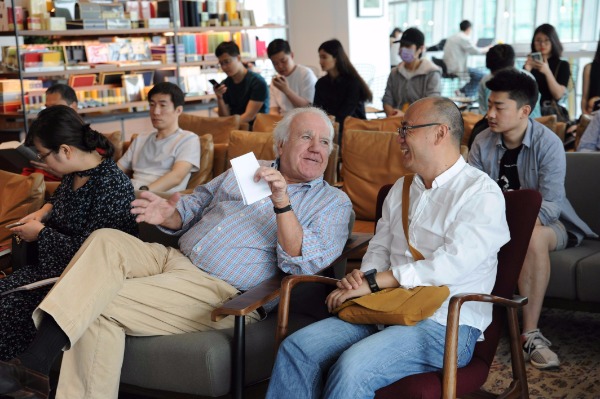 |
|
Peter Watson talks to Su Qi, deputy editor of financial magazine Caijing, during a promotional event in Beijing.[Photo provided to China Daily] |
To deal with the numerous intellectual achievements of human civilization, Watson uses three of them-the soul, Europe and experiments-as clues to lay out the history of ideas.
For him, the idea of the soul, unlike that of God, evolves beyond the advent of the secular world.
And he says the pursuit of "an alternative, better self" has led humankind into romanticism. As a former psychologist, he argues that it has eventually become the idea of the unconscious in the modern world.
As for experiments, he says they have taken people away from following authority blindly and become a driving force for scientific revolutions that have shaped the modern world.
Speaking about the rise of Europe, he says it began in the heyday of the Middle Ages and was later developed into a secular world with the birth of a series of new ideas, including the emergence of individualism, when people started looking on themselves not as a part of humanity nor belonging to God, but as an individual in their own right.
The subsequent Renaissance enabled Europeans to enjoy life instead of thinking about an afterlife. And, this was why, in Watson's view, Europe began to take over and led human civilization into the modern world.
However, by stressing the prosperity of European civilization, as Watson has pointed out, he doesn't necessarily fall into the trap of Eurocentrism.
"It's obvious in intellectual history that Europe led the way for nearly 1,000 years. I'm simply describing a reality that was there," says Watson.
Meanwhile, there are chapters in the book on Chinese civilization.
Watson says he is impressed by the big differences in the Han civilization (206 BC-AD 220) and the Song civilization (960-1279), both of which were responsible for enormous innovations.
"I am particularly fascinated by the Song civilization, because it took place just before the big changes in Europe," says Watson, adding that he is especially interested in the competitive ancient imperial examination for selecting civil servants that was set up to encourage social mobility and gave ancient China a high level of literacy and education.
During his recent trip to China, Watson also listed some of the areas in which he believes China is leading the world, such as renewable energy, AI and the treatment of prostate cancer.
"I don't think that we are particularly deaf to what is happening in China. In fact, we're hungry for new information," says Watson.
"And one is also looking to China for some innovative ideas about how to live with the internet."
As for the future, Watson says he is fascinated by the link between political and intellectual history.
"It's a history that has never been written. It'll be a lot of work, but a very fruitful area," he says. "I'm too old, but it can be a career for somebody."